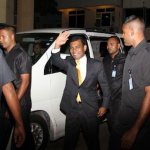President Mohamed Nasheed has said he will sign the decentralisation bill into law despite misgivings as any further delays would do “more harm than good”.
In his weekly radio address on Friday, President Nasheed said the constitutionality of some provisions could be challenged at court.
“I hope that after I ratify this bill, amendments will be made as soon as possible, within the present framework, to change the provisions where these conflicts could arise,” he said.
The president said grouping atolls into provinces and devolving decision-making powers concentrated in Male’ to seven regions was a campaign pledge of the ruling Maldivian Democratic Party (MDP).
“It’s not at all the case that the government decided to create provinces because there was a political opportunity or purpose in it,” he said, adding that it would be more politically advantageous to continue with the existing system of “considering the capital of the atoll to be the atoll council.”
Continuing with the traditional system would be the “narrowest” way of devolving powers, Nasheed said, adding he did not want to prolong the existing model of island and atoll development committees with “small, minimal powers”.
Meanwhile, the purpose of provinces was “to find a better path” for economic growth and development.
The province offices created in the first months of the new government was intended to “introduce and implement” the model, Nasheed said.
Moreover, he added, as the constitution empowers the president to create posts and offices for administrative purposes, desks were set up at the province offices for the main government ministries.
But, DRP MP Ahmed Nihan told Minivan News today the bill would not hamper development as it would vest “executive power” in the hands of the people and stipulate equal distribution of government funds.
He further accused the president of exercising executive power with “total disregard” to the constitution.
While the president was empowered to appoint councillors and state ministers by article 115 of the constitution, he said, the DRP did not accept that it could be done for the purposes of decentralisation in the absence of enabling legislation.
“We believe [the appointments] was made by misusing the powers granted by article 115 as it was done for political purposes,” he said.
Nihan added it would have been better for the president to voice concern about “building human resources” for decentralisation as the process was new to the country and was likely to result in teething problems.
On the issues of maintaining the existing administrative division into 21 atolls, Nihan said “the core reality is that Maldivians don’t want to lose their island identity.”
Moreover, he said the government’s fear that the bill would create “21 opposition governments within the country” was unfounded.
Empowerment
The decentralisation and regionalisation policy began with the appointment of state ministers under Home Minister Gasim Ibrahim, who quit his post 21 days into the new administration.
Gasim joined the DRP-PA MPs, several independents and the two MPs of the Dhivehi Qaumee Party to vote through the final bill by 42 votes.
The model of provinces was removed from the government’s bill by the opposition DRP-dominated committee after it was submitted for a second time in March this year.
Opposition MPs have argued that the atoll councils referred to in article 230(b) of the constitution must be established at the atoll level for the 21 administrative atolls of the country.
The battle over the legislation throughout the first two sessions of parliament involved forced cancellations, clashes in the chamber and protests.






President you can show the "nulafaakan" but you cannot fool us every time. You are well aware you have no choice now not to amend this bill. Because if you send it to Parliament to change it , you know well DRP will not give an inch on their position. If you don't sign after 15 days it will become a law automatically.
The other bill on local council election. because of your administration failures to properly draft a bill, the other bill now you are playing the politics to deceive the public of your mistakes.
President Nasheed you have failed in very aspect, we trust on you, now only you can show your "nulafaakan" thats it.
It should be ammended to include the gender quota!
In the current bill, women's committees will advise council on gender areas. However,women's committees, in most cases are headed by the island chief's wife and are not representative of women of the community. Most of them do not consult or work with the larger community. They dont advocate women's rights either. Therefore they shouldnt be given such a role.
The govt should let go of these committes, make them independent/re-register as an NGO or association.